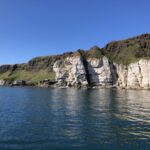A £4.5 million conservation project that will safeguard Rathlin Island’s internationally important seabird population and wildlife has been given the go ahead, following major funding.
The partnership project, known as Rathlin Acting for Tomorrow (LIFE RAFT), has received funding from EU LIFE, The National Lottery Heritage Fund (development phase) and Department of Agriculture, Environment and Rural Affairs (DAERA), with contributions from RSPB NI, Rathlin Development and Community Association (RDCA) and Causeway Coast and Glens Heritage Trust (CCGHT).
This £4.5 million island restoration project is set to be the largest-of-its-kind on the island of Ireland and will be delivered over five years. Focusing on natural heritage and community, the initiative will help Rathlin Island’s economic recovery following the impact of Covid-19, while protecting its important wildlife. Rathlin is known as a haven for wildlife, including many threatened species, and hosts Northern Ireland’s largest seabird colony, which is one of the most important breeding sites in both the UK and Ireland. However, its wildlife is under threat, including 25 bird species and notably the puffin which has declined by more than half in recent years1. One of the key threats is from predation by invasive non-native species. The project will safeguard Rathlin’s seabirds and ground-nesting birds that are under threat through a brown rat and ferret eradication programme. With 70% of visitors to Rathlin citing birds and wildlife as their main reason for visiting, by restoring Rathlin’s natural heritage, the project will bring benefits for the local community.
Michael Cecil, who chairs the RDCA and is the partnership representative, said: “As a community, Rathlin Islanders are proud to protect our natural heritage. We can see how it sustains our community and makes Rathlin a very special island. This project will help protect our livestock and crops, create over 30 jobs, increase on island spend and further promote Rathlin as a leader in eco-tourism whilst boosting our recovery from Covid-19. We hope this project will make Rathlin an even better place to live, work and visit.”
The project will be led by the expert conservation charity, RSPB, which has experience in similar island restoration projects on the Isles of Scilly, the Shiant Isles and most recently on Gough Island in the Tristan da Cunha archipelago in the South Atlantic Ocean. The RSPB has been working on Rathlin Island for over 25 years. RSPB NI’s Claire Barnett, Project Executive for LIFE RAFT, commented, “Bringing this global-scale conservation project to Northern Ireland is vital to safeguard the amazing wildlife on Rathlin. We would like to thank the local community, our partners and our funders for their support. Together, we will protect and promote Rathlin’s internationally important wildlife and landscape so future generations can enjoy seeing guillemots, razorbills, kittiwakes and the iconic puffins and possibly even the return of locally extinct species such as Manx shearwaters and storm petrels, which were once common on the island.” Agriculture, Environment and Rural Affairs Minister Edwin Poots MLA commented: “Rathlin is a very special place for wildlife and I’m delighted that my Department has provided funding totalling £537,374 towards this project. I would like to thank the Rathlin community and the project partners for the significant effort they have made to develop this project and secure the funding. Together we can work to restore the Island’s seabirds and support the community in its recovery from the Covid-19 pandemic.”
Graham Thompson, Chief Executive of Causeway Coast and Glens Heritage Trust added, “This is a hugely important project for Rathlin, the Antrim Coast and Glens, Northern Ireland and the island of Ireland. The formal starting point has been a long time coming; there have been almost 10 years of hard work, research and development to get us where we are today. Key to this project has been and will continue to be the constructive partnership approach engaged by all partners including the RSPB, DAERA, CCGHT and by far most importantly the entire Rathlin Island community.”
Speaking on behalf of The National Lottery Heritage Fund, Mukesh Sharma, Chair, Northern Ireland said, “We are delighted to support RSPB NI and its partners as they embark on a new project to protect the native natural heritage on Rathlin Island. With the help of funds raised by National Lottery players, this project has the potential to make a significant difference for the local community and visitors, and we’re looking forward to working with the Rathlin team as it develops.”
The project has entered a development phase and operations will commence in 2022. This is just one of the projects that Rathlin Island is undertaking to protect, support and enhance the community and its unique environment, including actions to become carbon neutral by the end of the decade.
For more information visit www.rathlincommunity.org/rdca or www.rspb.org.uk/NI


